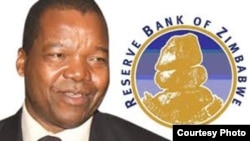WASHINGTON —
Central bank governor John Mangudya says the Reserve Bank of Zimbabwe will strive to tackle serious challenges facing the Zimbabwe economy including low aggregate domestic demand, deterioration of the balance of payments, banking sector vulnerabilities and depressed industry capacity utilization.
In a statement, Mangudya said the lack of liquidity and its limited circulation within the economy remains the biggest immediate challenge that the Zimbabwe economy is facing.
He said at the epicenter of the liquidity crunch is the country’s banking sector, which has been operating without a formal interbank market and a lender of last resort since the introduction of the multiple currency system in 2009.
Mangudya said the central bank would need to attend to these challenges and come up with solutions for the betterment of the economy.
He noted that the bank would need to arrange for funding to capitalize itself and also achieve its major role of lender of last resort.
Mangudya said he believes in having a transparent and responsible central bank that would be able to promote a strong and stable financial system.
According to the new bank chief, who took over from retired Gideon Gono this month, the central bank would also ensure that the multiple currency system is buttressed and maintained to restore and enhance confidence and credibility.
The central bank once embarked on quasi-fiscal activities like the provision of farm implements to farmers mostly aligned to Zanu PF at the height of Zimbabwe’s economic crisis. It currently owes private companies and non-governmental organizations millions of dollars it seized from their accounts between 2003 and 2008.
In a statement, Mangudya said the lack of liquidity and its limited circulation within the economy remains the biggest immediate challenge that the Zimbabwe economy is facing.
He said at the epicenter of the liquidity crunch is the country’s banking sector, which has been operating without a formal interbank market and a lender of last resort since the introduction of the multiple currency system in 2009.
Mangudya said the central bank would need to attend to these challenges and come up with solutions for the betterment of the economy.
He noted that the bank would need to arrange for funding to capitalize itself and also achieve its major role of lender of last resort.
Mangudya said he believes in having a transparent and responsible central bank that would be able to promote a strong and stable financial system.
According to the new bank chief, who took over from retired Gideon Gono this month, the central bank would also ensure that the multiple currency system is buttressed and maintained to restore and enhance confidence and credibility.
The central bank once embarked on quasi-fiscal activities like the provision of farm implements to farmers mostly aligned to Zanu PF at the height of Zimbabwe’s economic crisis. It currently owes private companies and non-governmental organizations millions of dollars it seized from their accounts between 2003 and 2008.




